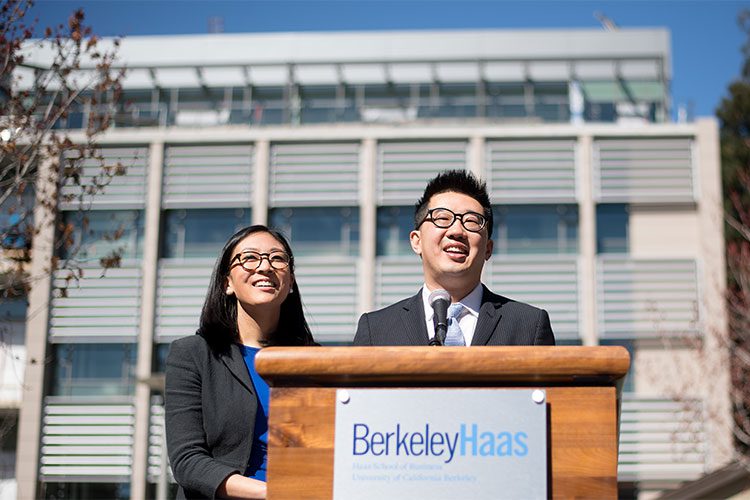Berkeley Haas Opens Fall 2017 With Its Largest Full-Time MBA Class Ever and New Building

Like many top business schools this time of year, the Haas School of Business at the University of California at Berkeley is welcoming its incoming class of MBA students—but at Haas it’s a bigger group than ever before moving into brand-new digs that promise to be among the greenest in the nation.
There are 284 students in the entering class—32 more than last year—which brings what has long been the smallest leading business school more in line with some of its peers. Plans for next year include additional expansion, to a class size of 300. The grand opening of a new academic building—in progress for the past decade—made increasing the class size possible.
“The intimacy of the class is really an important part of what Haas is about,” Dean Richard Lyons acknowledged in a June interview with Clear Admit. But at just 250 students, where the school has hovered for many years, it has been a gross outlier—a mere third the size of Wharton and not even a third the size of Harvard. “Part of the reputation of the school is a function of its scale, and there are times where you are just not at the right reputational scale—you’re too small,” Lyons continued. “It’s a super intimate experience—there’s no question about that—but target companies want to go to a place where there are enough people graduating that they can send a team of recruiters, for example. If you are too small you are below the threshold.”
“We Don’t Want to Lose the Smallness That Makes Us Unique”
Precisely because the intimacy and close-knit nature of Haas is such an integral part of its culture, the administration, including the admissions team, has approached the process of increasing the class size carefully and thoughtfully. “I think people would be surprised by the amount of care that has been taken to consider potential ramifications,” Peter Johnson, assistant dean for the full-time MBA program and admissions, tells Clear Admit, adding that his team considered necessary adjustments of everything from budgets to graduate student instructors, program office staff to career coaches. “We have been very intentional about it because we don’t want to lose the level of smallness that makes us unique. A lot of our students were very concerned that it not change the experience for future students.”
Not only is the incoming class larger than any before it, it is also one of the strongest academically, Johnson says. Average GMAT scores and GPAs have risen over each of the past three years. The average GMAT score this year was 725—a jump from last year’s 717—and the average GPA climbed, too, from 3.64 to 3.71. Application volume also increased this past year, which meant that though the school admitted more students overall to increase class size, the acceptance rate remained constant at 12 percent. HBS, by comparison, generally accepts approximately 11 percent of its applicants.
The incoming class includes 40 percent women, up slightly over last year though still off from the record 43 percent that made up the Class of 2016. International students drawn from 42 different countries make up 39 percent of the class, up from 38 percent last year. Haas leads HBS, Wharton, and Kellogg in this metric, whose incoming classes are all around 35 percent international. Despite concerns that talk of potential immigration and visa reform under the current administration could have a chilling effect on international application volume, applicants from abroad applied in equal numbers this year as last, Johnson notes. U.S. minority students comprise 29 percent of the class, down from 32 percent last year.
In terms of what they did before coming to Haas, members of the Class of 2019 are an incredibly interesting bunch. Among them are a business development manager from Intel who led development of Google’s self-driving cars, an investment banker who ran from San Francisco to New York City over the summer to raise money and awareness of ALS in honor of his grandmother, a Bain consultant who earned four culinary diplomas in her spare time, a student from Nepal who helped senior political leaders and ex-ministers from five major parties negotiate a new constitution, and the founder and CEO of an Indian irrigation company that saves 4 billion liters of water annually while enabling smallholding farmers to produce 10,000 additional tons of food per year.
A quarter of the incoming students worked in consulting prior to Haas, and another 20 percent worked in finance. In terms of undergraduate degrees, 42 percent studied business or economics, 36 percent hold STEM degrees, and 8 percent graduated with degrees in the humanities.
“Top students from around the world with diverse backgrounds and amazing accomplishments continue to choose us for our distinctive culture,” Morgan Bernstein, executive director of full-time MBA admissions, said as part of an article on the Haas website. “No one else has the culture and community that we do.”
Can Chou Hall be the Greenest Academic Building in the U.S.?
The Haas Class of 2019 is the first to inhabit the newly opened Connie & Kevin Chou Hall, an 80,000-square-foot facility that boasts state-of-the-art classroom technology, flexible learning spaces, and features such as efficient heating, cooling, and lighting systems. These, in addition to rainwater cisterns and 24,300 square feet of exterior windows, helped it earn both LEED Platinum certification and WELL certification (an additional accolade applied to buildings that promote the health and well-being of their users).

Kevin Chou and Dr. Connie Che appearing at the Berkeley Haas School of Business last March, after announcing their record-breaking school donation (Noah Berger/2017)
The building bears the name of Kevin Chou, BS ’02, founding CEO of mobile gaming company Kabam, and his wife, Dr. Connie Chen, in recognition of their $25 million donation, the largest to date from an under-40 alum. The remaining funds for the $60 million building also came entirely from alumni and friends of the school.
In addition to LEED Platinum and WELL certification, Chou Hall has been designed to divert 90 percent of waste—including through the mandatory use of reusable mugs and water bottles that can be replenished at filling stations and compost and recycling bins on every floor—which will allow it to achieve zero waste certification by summer 2018. This would make it the first business school in the country to do so.

Early-stage concept art for the Connie & Kevin Chou Hall.
There are no places to dispose of other types of trash—encouraging those who use the building to adopt a “’pack-it-in, pack-it-out’ mentality,” according to Courtney Chandler, senior assistant dean and chief strategy and operations officer. “It might take a little getting used to, but we don’t think it will be hard for the Haas community—we’re all about questioning the status quo and redefining business-as-usual,” Chandler said in a story on the Haas website, referring to two of the school’s defining principles.
The building includes eight tiered classrooms and four flexible classrooms, totaling 858 new classroom seats, as well as 28 student and meeting rooms. This provided the much-needed additional space Haas required to expand its class size. A sixth-floor event space will open next month, and a café offering sustainable, locally sourced food—what else—is slated to begin serving students in early 2018.
This article has been edited and republished with permissions from Clear Admit.
Can Online MBA Programs Help Gender Imbalance At Business Schools?

Ongoing diversity and inclusion at business schools, like many universities, has become absolutely paramount. But there’s no mistaking one singular aspect where business school’s tend to fall short: gender imbalance.
Continue reading…
Harvard, Stanford Earn Most Annual Business School Applicants

There are so many factors to consider when applying for an MBA program, it can often be overwhelming. Between cost, admissions requirements, location and program quality, narrowing down a select few to focus on for the application process is a challenge within itself. Nonetheless, between the time required to complete an application and the expense of application fees, it’s simply impossible to apply to every program you find interesting. Narrowing your focus to only your top choice schools can save time, money and a load of heartache.
While factors such as those mentioned above, like cost and location, are great ways to help narrow down your options, it is also helpful to take into consideration the competitiveness of each program. For many high-regarded MBA programs, the applicant pool can be so large that only a very small minority of applicants are accepted each year. While it may seem encouraged to “shoot for the stars,” understanding the real probability of your admission to a program can be a crucial factor in deciding whether or not to apply.
Thankfully, the U.S. News Short List, which focuses on particular data points from schools and degree programs around the country, recently compiled a list of MBA programs with the most applicants. As expected, these include some of the top programs in the country all ten programs with the highest applicant numbers were also included among the top 20 schools in the U.S. News 2017 Best Business School Rankings, and eight of them in the top ten.
While these are some of the top programs in the country, more applicants also means more rejections. All ten of these schools have acceptance rates lower than 25 percent, which means the majority of applicants are rejected. For many of these schools, the numbers are staggering. Of the 129 schools ranked this year by U.S. News, the average applicant number was 917. At Harvard Business School, which tops the list of largest applicant pool and the publication’s top-ranked business school in the country, there were 9,686 applicants for the fall of 2015.
Following HBS with the second most business school applicants is the Stanford Graduate School of Business with 7,899 applicants in the fall of 2015 and an acceptance rate of just 6.1 percent. The University of Pennsylvania (Wharton) placed third with 6,590 applicants and a 19.8 percent acceptance rate. Columbia Business School, ranked tenth best business school by the publication, received 5,829 applicants in the fall of 2015 and accepted just 18 percent of its applicants.
Also among the schools with the largest applicant pools were:
- Northwestern University (Kellogg): 4,300 applicants, 5th (tie) in ranking, 20.6 percent acceptance rate
- University of Chicago (Booth): 4,284 applicants, 2nd (tie) ranking, 24.4 percent acceptance rate
- Massachusetts Institute of Technology (Sloan): 4,254 applicants, 5th (tie) ranking 14.6 percent acceptance rate
- New York University (Stern): 3,696 applicants, 20th in ranking, 20 percent acceptance rate
- University of California—Los Angeles (Anderson): 3,533 applicants, 15th in ranking, 19.8 percent acceptance rate
- University of California—Berkeley (Haas): 3,506 applicants, 7th in ranking, 13 percent acceptance rate
Certainly, if you have an extensive resume and strong GRE scores, among other factors, there’s no reason why you shouldn’t be part of the small percentage of accepted applicants to these schools. However, full awareness of the probability of acceptance and competitiveness of each program can be important in narrowing down the schools you choose to apply to. Although these are schools with the largest pools, tracking down information about acceptance rate is a great idea for any program you are considering. For example—the Muma College of Business at the University of South Florida, which had the fewest applicants in 2015, had a 100 percent acceptance rate. If your goal is to save as much time and money as possible as you begin your degree, focusing on schools with high acceptance rates such as this can only make this already complicated process that much simpler.
Hot MBA Jobs – Nonprofit Fundraiser

It goes without saying—everybody likes making money. But while everyone loves some extra change in their bank accounts, some really get a sense of accomplishment working directly for a cause or nonprofit corporation.
Amid Roller Coaster Rides for Some, HBS Stays Atop Bloomberg BusinessWeek Ranking

For the second consecutive year, Harvard Business School (HBS) tops the Bloomberg BusinessWeek annual ranking of MBA programs—released today—making it one of the few leading schools that didn’t experience shifts in a list that holds lots of changes this year over last.
Trump vs. Clinton: What It Means to Business School Students

It may be U.S. citizens headed to the polls today, but another group is watching the outcome of the presidential election pitting Donald Trump against Hillary Clinton with much more than simply passing interest. Prospective international students thinking of studying in the United States could be significantly impacted by today’s outcome.
National Public Radio (NPR) last month reported on a survey—conducted by FPP EDU Media, a company that matches international students with international programs, and college marketing company International Education Advantage LLC (Intead)—that found that of more than 40,000 prospective students surveyed from 118 countries around the world, 60 percent said they were less likely to study in the United States if Trump is elected, compared to 3.8 percent who reported they would be less likely to choose a U.S. school if Clinton wins.
The survey didn’t ask why, but Intead CEO Ben Waxman told NPR that he suspects Trump’s positions on immigration—including a proposed ban on Muslims entering the country and a wall on the Mexican border that Mexico would pay for—were likely factors. In breaking out prospective students by individual country, the survey found that 80 percent of Mexican students said they would be less likely to study in the U.S. with Trump in the White House.
We should note that the FPP EDU Media/Intead survey included prospective students at both undergraduate and graduate levels and did not break responses out by level of study.
To get a sense of how many international students contemplate graduate management study in the United States, we turned to the Graduate Management Admission Council (GMAC). According to GMAC’s most recent Applicant Trends survey, the majority of applicants seeking admission to full-time two-year MBA programs for the incoming class of 2016-17 were international candidates, representing 52 percent of the applicant pool. Domestic candidates accounted for the remaining 48 percent. The percentage of international students who ultimately enroll at leading business schools is not quite that high, although at most schools they make up a solid third of the class or more. The University of Pennsylvania’s Wharton School this year welcomed 32 percent international students as part of its incoming class, Harvard Business School (HBS) and Kellogg School of Management each boast 35 percent international students and UC Berkeley’s Haas School of Business is at 38 percent.
So, how international applicants perceive study in the United States based on the results of this election could have significant impact on graduate management education as a whole as well as on individual MBA programs at some of the nation’s top schools.
Trump’s Potential Impact on Leading MBA Programs Limited, Hope Some
Rafael Rivera, a dual-degree candidate at HBS and the Harvard Kennedy School, says that if he were just now applying to business school, a Trump victory wouldn’t deter him from coming to the United States. “Even if Donald Trump wins, the U.S. has still a strong, vibrant economy, which has better prospects than other regions such as Europe or Latin America,” he tells Clear Admit. “Also, the best MBA programs are here. I don’t see why the quality of those programs would go down if Trump wins.”
That said, Rivera does have friends and colleagues in his home country of Mexico currently applying to MBA programs who have expressed disappointment about the American elections. “As you can imagine, Mexican citizens feel offended by the constant negative comments of the Republican candidate and his intentions to build a wall.”
HBS Poll Finds Hillary a Clear Favorite
A project Rivera and a fellow HBS classmate undertook earlier this fall underscores how much the U.S. election is in the minds and hearts of even those who can’t cast a ballot. Rivera, together with Jeremy Au, HBS Class of 2017, polled fellow HBS classmates in late September and early October for a pioneering election poll published in the Harbus student newspaper on Oct, 19th.
Rivera and Singapore-born Au are both foreign nationals, which means they cannot vote in tomorrow’s elections. “The idea came because we are both interested in politics (in our respective countries), and we are really interested in getting to know people’s opinion regarding public issues,” Rivera tells Clear Admit. “We hear a lot about polls around the U.S., but we really didn’t know what our classmates think about national issues,” he continues.
These motivations—as well as a poll run by undergrads for the Harvard Crimson—inspired them to run their own poll. “We didn’t have any particular agenda with this poll—we only had the curiosity to know the opinion of our classmates in such important days,” Rivera says. Between Sep. 19th and Oct. 3rd, 236 first-year HBS students were surveyed across multiple sections via in-class voting with privacy screens, and the data was weighted for nationality and gender.
What They Found Surprised Them
Rivera and Wu, in a Harbus piece later republished by the Huffington Post, revealed their findings: HBS students clearly favor Clinton. Clinton received 85 percent of the vote, compared to Trump’s 3 percent. Libertarian nominee Gary Johnson beat out Trump as well, garnering support from 10 percent of those polled. Green Party nominee Jill Stein brought up the rear, trailing just behind Trump with 2 percent of the vote.
“American and international students did not show a statistically significant difference in their preferences,” wrote Rivera and Wu. That said, international students were slightly more in favor of Clinton (88 percent) and even less in favor of Trump (1 percent) than their U.S. classmates (84 and 3 percent respectively). In fact, among international students, Trump trailed both third-party candidates as well, with Johnson getting 7 percent of the vote and Stein getting 4 percent.
Of course, these results are nothing like the incredibly close race suggested by the most recent polls of U.S. voters. As of this writing, Nate Silver’s FiveThirtyEight website shows a popular vote narrowly in Clinton’s favor, 48.8 percent compared to 45.1 for Trump, with Johnson claiming another 4.7 percent.
Rivera and Wu cite four key factors as contributing to Clinton’s lead among HBS students: Obama’s high approval rating among HBS students (88 percent) relative to U.S. voters (52 percent); more HBS students lean Democratic (53 percent) than U.S. voters (36 percent); more HBS Dems support Clinton (94 percent) than HBS Republicans support Trump (52 percent); and HBS independents fall overwhelmingly in Clinton’s camp (80 percent compared to 0 percent for Trump).
Wu and Rivera also note that HBS students are more socially liberal than U.S. voters—on issues ranging from stricter gun control to women’s rights. Where immigration is concerned, HBS students are three times more likely to support increased immigration (63 percent, compared with 21 percent of U.S. voters). On the issue of immigration, 68 percent of international HBS students favored increases, compared to 60 percent of their U.S. classmates.
Interestingly, on the question of whether the distribution of money and wealth in the United States today is fair, HBS student sentiment was almost identical to U.S. voters, with 62 and 63 percent respectively responding that it should be more evenly distributed among a larger percentage of the people. But in terms of how that redistribution might take place, HBS students were divided. Of U.S. HBS students, 38 percent were in favor of heavy taxes on the rich for wealth redistribution. More than half—53 percent—of international HBS students were in favor of higher taxes.
Rivera and Wu cite three factors they believe as potentially contributing to the overall poll results. “HBS students have higher levels of education, higher levels of household income and are younger than the general U.S. population,” they write as factor one. “Most HBS students have work experience in the private sector, and are thus more exposed to workplace issues, international markets and diverse work teams,” they cite as the second factor. “First-year HBS students have also undergone 2 months of daily interactions within 90-student sections, which are sorted for high diversity in nationalities, ethnicities, and experiences,” they offer as a third factor (the complete survey methodology and results can be viewed here).
Wharton Wary of Association with Trump
HBS was the only leading business school we found that had conducted its own election poll, but it is certainly not the only school where anti-Trump sentiment has been documented. Much earlier in the campaign, students at the University of Pennsylvania’s Wharton School sought publicly to distance themselves from the viewpoints of fellow Wharton graduate Trump (who completed two years of college at Wharton after transferring from Fordham and received his undergraduate degree from the school.Trump does not hold a Wharton MBA degree).
In an open letter in July published on Facebook, a contingent of Wharton students, alumni and faculty set out to make clear that Trump does not represent them. “We, proud students, alumni, and faculty of Wharton, are outraged that an affiliation with our school is being used to legitimize prejudice and intolerance. Although we do not aim to make any political endorsements with this letter, we do express our unequivocal stance against the xenophobia, sexism, racism, and other forms of bigotry that you have actively and implicitly endorsed in your campaign,” read the letter, which had garnered more than 600 signatures within days of its publication. As of Nov. 6th, 4028 people had signed.
Likewise, the newspaper of Trump’s alma mater elected not to endorse him for president. In a letter published on Oct. 18th, the Daily Pennsylvanian wrote, “We at the Daily Pennsylvanian are concerned about the precedent that Donald Trump sets for our fellow peers and how he chooses to leverage his affiliation to Penn to the rest of the world. His divisive policies are not only orthogonal to those of Penn, but to democracy.” The letter concluded, “The Daily Pennsylvanian Opinion Board cannot stand behind Donald Trump as a candidate.”
To be sure, the views expressed by the Daily Pennsylvanian are those of the paper’s board—not of the University of Pennsylvania or of Wharton. Both have remained steadfastly tight-lipped throughout the contentious election season about the bombastic alumnus. According to both Politico and the Daily Pennsylvanian, administrators in fact sent an email to Wharton faculty shortly after Trump announced his candidacy in summer 2015 encouraging them to decline media requests for comment and instead direct queries about Trump to the school’s communication staff. The communications staff, for its part, has consistently refrained from commenting.
This post was republished with permission from Clear Admit.
